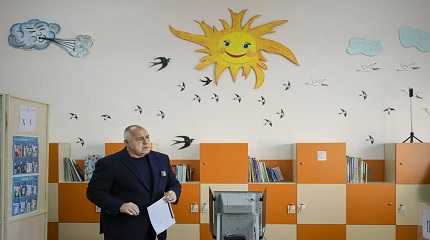
SOFIA, Bulgaria (AP) — Bulgaria held its fifth general election in two years Sunday, which political leaders hoped would end government instability and provide a path to overcoming economic woes fueled by the war in Ukraine.
Turnout was expected to be low due to voter apathy and disillusionment with politicians, who have been repeatedly unable to cobble together a viable governing coalition.
The latest opinion polls suggested the chances for an immediate end to the political stalemate were low, with up to seven groups potentially reaching the 4% threshold to enter a fragmented parliament. According to the polls, populist and pro-Russia parties were likely to increase their representation.
Most pollsters see three-time Prime Minister Boyko Borissov’s center-right GERB party running neck-and-neck at around 26% with its main rival, Kiril Petkov’s liberal We Continue the Change party, which recently formed a coalition with the right-wing Democratic Bulgaria.
After casting his ballot, Borissov said wisdom from politicians was the only way out of the crisis. He said Bulgaria must have a stable government “if we don’t want to commit suicide as a nation.”
“It will be a catastrophe for the country, if a ruling majority could not be formed,” Borissov said, adding that he was ready to compromise.
Asked about a future coalition with Borissov’s GERB party, the co-leader of Democratic Bulgaria, Hristo Ivanov, said that governing with partner parties requires a high level of trust and understanding. He added that he did not think a coalition with GERB met those conditions.
“We will be, rather, looking for a formula that is based on some kind of unity around specific priorities,” Ivanov said.
The We Continue the Change party has said it would also reject a coalition deal with GERB if Borissov remained at its helm. We Continue the Change, which regards Borissov as a divisive figure and has accused him of promoting corrupt policies, proposed forming a minority government with the support of GERB, which rejected the idea.
Still, party leaders were trying to soften their aggressive rhetoric to find an alternative to the consecutive caretaker governments appointed by President Rumen Radev in the last few years that have quietly shifted the country’s orientation toward Russia.
Traditionally, many Bulgarians share pro-Russia sentiments, which provides fertile soil for aggressive Kremlin propaganda in the poorest European Union member country.
Polls indicate the ultra-nationalist Vazrazhdane party, a fierce supporter of the Kremlin’s war in Ukraine, could increase its parliamentary presence from 10% to 13% of seats.




